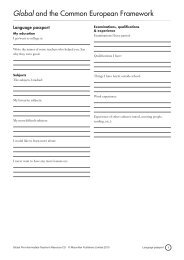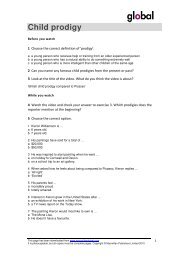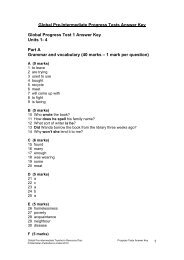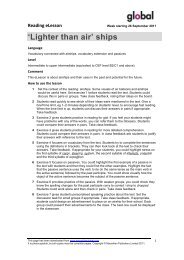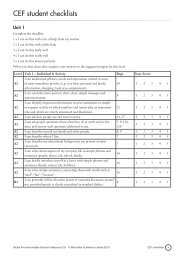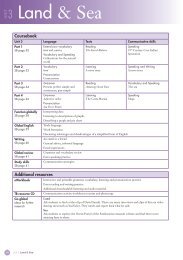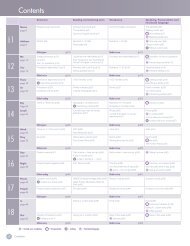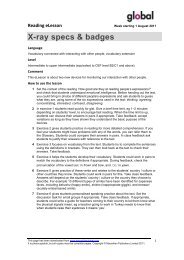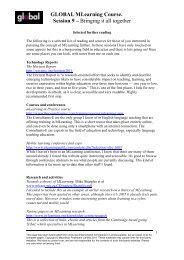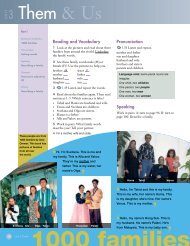Teacher's Book teaching notes - Global
Teacher's Book teaching notes - Global
Teacher's Book teaching notes - Global
You also want an ePaper? Increase the reach of your titles
YUMPU automatically turns print PDFs into web optimized ePapers that Google loves.
UNIT4Hopes & FearsPart 4TEACH globalThink localLead-inBefore class do an image search online with the key words:polar bear and coral reefs and show students selectedimages. Elicit why we should be worried: the polar bear’shabitat / survival is threatened by melting ice; 60% of theworld’s coral is predicted to have died by 2030, due largely towarming waters. Elicit the global problem: climate change orglobal warming. Write these up on the board. Ask students ifthey can give other examples of climate change.Vocabulary (SB page 48)1 Students complete the missing words, alone initially,without a dictionary. Then they work together in pairs.2 1.51 Ask students to listen and check their answers,then repeat the words after the recording. Drill any trickywords, eg flood /flʌd/, ocean /ˈəʊʃən/ and desert /ˈdezət/.1.511 Europe – stronger storms and increased chance of floods2 Africa – lakes and rivers disappearing3 New Zealand – oceans getting warmer4 Mexico, US – Numerous forest fires5 Africa – Area of desert increasing6 Greenland – Glacial ice meltingDo a web search using the key words: An InconvenientTruth film or go to www.climatecrisis.netThe film is about future problems related to globalwarming.1.521: An Inconvenient Truth? Isn’t that a documentary from afew years ago about global warming? No. I haven’t seen it,no. I heard it was interesting.2: Well, of course I knew about global warming a bit beforeI saw the film … but, well …. wow. I mean, it really makesme think about what I’m going to do. If we don’t dosomething now, we’ll have serious problems in the future.3: All I want to say is that I saw this film. It was a greatdocumentary, and it’s very very important.4: Oh, yes I remember this film. I saw it after Al Gore won theNobel peace prize. I learned a lot. It was different from ausual Hollywood film.5: I didn’t like it. These kinds of documentary films arealways frightening. And anyway, when this climate changehappens, I’ll be dead. So I don’t want to worry about itnow.6: I haven’t, but my son saw this film at school, in hisgeography class. He was talking about it all evening. Hesaid: “You’ll think differently after you see it.” I think it’sgood that he learns about this kind of thing at school.3 Give students time to read the statements for eachspeaker first. Write the name Al Gore up, explaining whohe is. Play the recording and monitor – play the recordingtwice at this stage, if necessary.TEACH globalThink localExtra activityStudents compare <strong>notes</strong> before whole-class feedback.Students have a group discussion on climate change. Tellthem you will ask groups for their opinions and comments inseven minutes (give less or more, as appropriate). Studentschoose a representative to take <strong>notes</strong> and report back.Dictate these:Have you felt or seen any signs of climate change yourself?Can you remember any other examples of climate changewhich you have heard of?Are we causing climate change or is it a natural thing?What do you think is going to happen?Listening (SB page 48)This listening comprises different people giving theiropinions about the film and its message.1 Students write down the name of the most terrifyingfilm they have seen, then discuss in threes.Ask students to look at the poster on page 49 and respondto the two questions. Explain this is not a typical ‘horrormovie’.1 F2 F3 TBackground note4 F5 F6 TAlbert Gore (born 1948) is an American politician. He was theVice-President under President Bill Clinton from 1993–2003.He is also a businessman and environmentalist. He wrote AnInconvenient Truth and starred in the Academy-award winningdocumentary based on the book, although some of the claimsmade are not universally accepted. He won the Nobel Peaceprize (2007) for his work on climate change.4 Students respond to the question as a whole class.Encourage students to give reasons. If one of the studentsuses an -ing or -ed adjective, write the sentence on theboard in preparation for the next stage.2 1.52 Students listen and compare ideas in pairsbefore feedback. If you have the technology, you couldalso watch a clip of this film on video sharing websites.52Unit 4 Hopes & Fears



